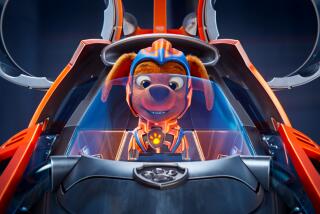MOVIE REVIEW : Bluth’s ‘All Dogs Go to Heaven’ Is Bland Family Fare
- Share via
I’ve always loved the idea of feature-length animated movies more than I’ve loved the movies themselves. Although there are many notable exceptions, animation seems to work best in the short form; few feature-length animated movies have the sustained snap and invention of, say, the best Disney and Warners shorts.
This is to some degree a matter of economics. The cost of producing an animated feature is so prohibitive, and the labor so painstaking, that most film makers opt for the commercially safe “family entertainment” mode. Irreverence is generally the first casualty of the long form.
“All Dogs Go to Heaven,” the latest animated feature from Don Bluth (“The Land Before Time,” “An American Tail”), is in the comfy fun-for-the-entire-family category. Except, as is so often the case with such movies, it’s not really a whole lot of fun for anyone. The animation is of variable quality; the story is a garbled pastiche of “Oliver Twist” and “Little Miss Marker;” the songs, including four by Charles (“Annie”) Strouse, are eminently unhummable. Adults probably won’t find the story transporting enough to stifle yawns; children won’t pop their eyes at the animation.
Even on a product tie-in level, the film falls short. Charlie, the junkyard dog at the film’s center, is rather mangy and uncuddly. Do the Wendy’s executives who arranged the marketing tie-ins with this movie really believe that rubber figurines of a flea-specked mutt will sell burgers? The most memorable thing about Charlie is that he is voiced by Burt Reynolds. Charlie/Burt actually gets to sing a few songs, making this the first time Reynolds has crooned onscreen--sort of--since “The Best Little Whorehouse in Texas” and before that, “At Long Last Love.” Some milestones are millstones.
Charlie and his dachshund chum Itchy (Dom DeLuise) break out of prison at the start of the film and make their way back to the Louisiana nightclub Charlie co-owns with the bulldog Carface (Vic Tayback).
When Charlie is rubbed out by Carface, he zooms off to heaven, where he pirouettes with a cloudborne greyhound angel (Melba Moore) before sneaking back to Earth for some pay back. There, he snatches from Carface’s clutches an orphan girl, Anne Marie (Judith Barsi), who has the ability to talk to animals--which comes in handy when betting on rat races and kangaroo boxing matches.
With Anne Marie in tow, Charlie and Itchy put their new-found booty into their own nightclub, Charlie’s Place. But then innocence rears its ugly head. Anne Marie wants Charlie to find her parents. And she disapproves of gambling.
Considering how integral Anne Marie has been to Charlie’s betting success, her sudden disapproval has the hollowest ring since Claude Rains was shocked--shocked--to discover gambling going on at Rick’s place in “Casablanca.” Don Bluth and his screenwriter, David Weiss, may be able to sleep better at night because of this little tyke’s willed naivete, but her virtuousness is a drag on the action. The only time the movie jolts to life is when Carface and his underlings are scampering and slavering.
A tip-off to the film’s vacuity is its vision of heaven, which appears to have been color-coordinated in shades of Pepto Bismol. Shouldn’t a movie keyed to the wonderment of childhood look more wonderful? When animation falls short, as it does here, we feel the lack more severely than we would in a live-action film, since the expressive possibilities of animation seem limitless. Virtually anything can be made to happen.
A great animated film delineates the entrancements and poetic leaps of imagination that are central to a child’s fantasy life--and an adult’s fantasy life too. That’s why, when we’re in the presence of great animation, we feel as if our childhoods have overwhelmed us. Suddenly, everything is possible. In “All Dogs Go to Heaven,” the possible is the mundane.
More to Read
Only good movies
Get the Indie Focus newsletter, Mark Olsen's weekly guide to the world of cinema.
You may occasionally receive promotional content from the Los Angeles Times.










